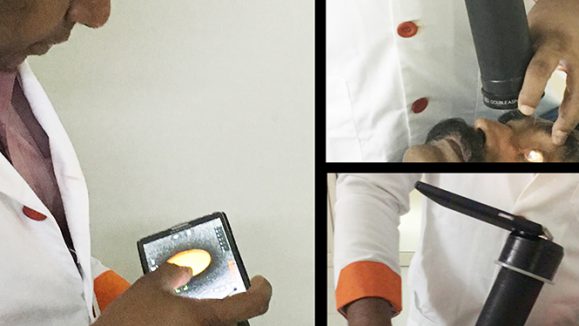Digital retinal imaging uses high-resolution imaging systems to take pictures of the inside of the eye, helping doctors to detect and manage diseases like glaucoma, diabetes, macular degeneration, cancer, diabetic retinopathy and retinal detachment. Finding such disorders as early as possible is critical to prevent serious disease progression and vision loss.
However, one of the problems ophthalmologists sometimes face in retinal screening is the high cost of imaging equipment. This can make diagnosing and treating conditions difficult, which may ultimately result in total and irreversible vision loss.
Due to lack of affordable and accessible imaging services, babies and people with diabetes in India, in particular, are at risk. Without early detection or annual screenings, patients with retinopathy of prematurity (ROP) or diabetic retinopathy (DR) can lose their eyesight. Unfortunately, not many hospitals – especially those in rural areas in developing countries like India can afford conventional eye screening equipment. Not only are these imaging systems expensive, they are usually bulky and require specialists to operate them, making them impractical in rural areas lacking in access, not to mention resources.
Thankfully, two companies are creating smart-phone or hand-held-based hardware and applications to provide imaging services to these underserved areas.
Anand Sivaraman, co-founder and CEO of Remidio Innovative Solutions (Bangalore, India) has come up with a low-cost imaging device, the “Fundus on Phone” (FOP), which can be hooked onto a mobile phone camera to take images of the retina.
And Carl ZEISS Meditec (Jena, Germany) is offering a hand-held device called the VISUSCOUT 100 to make screening more accessible.
“More than 90% of preventable vision loss is due to diabetic retinopathy, glaucoma, cataract and refractive error,” explained Dr. Sivaraman. “Many of these cases are present in rural areas in the developing world. A low specialist-to-patient ratio of 1:1000, together with the high cost of existing high-quality desktop imaging devices, results in poor access to quality healthcare in the screening, diagnosis and management of eye diseases in the remote areas.”
Devices like the FOP, that provide high-quality non-mydriatic (no pupillary dilation required) images at the quarter of the cost of existing high-quality desktop systems, play a very important role in remote areas. “It is the only smartphone-based retinal imaging device that uses infrared live view to ensure that pupils as small as 3 mm can be imaged,” said Dr. Sivaraman. A 45-degree field-of-view in a 3 mm pupil can be observed on the smartphone, in an extremely compact, portable format. ]
This technology used in Remidio’s FOP has also been demonstrated to produce high-quality images, with a clinical sensitivity of 93% and specificity of 98%. The device is simple to use with its smartphone touch display interface and it can be used either on a slit lamp or in a handheld mode or with a unique accessory for patient stabilization called the portable chinrest. Remidio’s FOP has so far impacted more than 5 million people globally in over 12 countries, according to Dr. Sivaraman.
The VISUSCOUT 100 from ZEISS is a mobile fundus camera with non-mydriatic operation and a precise autofocus function – which means that, like the FOP, pupil dilation is not required. In addition, the optional WiFi functionality enables instant transfer of images to the VISUHEALTH online platform where images are saved together with patient’s data and shared with a remote ophthalmologist for diagnosis. The VISUSCOUT 100 uses the VISUHEALTH platform (also from ZEISS) to connect more than 40 remote clinics to three ophthalmic clinics in Theni, Bangalore and Hyderabad.
The VISUSCOUT 100 takes color and red-free images instantly with a 40-degree field-of-view, while nine internal fixation LEDs help align the patient correctly and facilitate the capture of peripheral images. This technology gives people in remote villages an access to early detection for diseases like DR, without having to visit an ophthalmologist in a larger city. In addition, the VISUSCOUT 100 can be operated by a family doctor, technician or nurse, and then the images can be sent to an ophthalmologist through VISUHEALTH. (The VISUSCOUT 100 and VISUHEALTH online platform are not available in all markets.)
“ZEISS Medical Technology uses the VISUHEALTH platform in providing eye care to remote regions of the world, giving patients access to state-of-the-art eye exams,” shared Dr. Ludwin Monz, President, and CEO of Carl ZEISS Meditec.
“In a recent meeting with India’s Health Minister, Health Secretary and various bureaucrats in Nirman Bhavan, New Delhi, I have proposed nationwide screening of diabetic retinopathy, a program to prevent blindness: STOP (Screening Tele Ophthalmology Prevent) Blindness. The screening will be conducted using Remidio’s “Fundus on Phone” (FOP) imaging device. Non-skilled personnel will be trained to take retina photos and send them to the reading center at Aditya Jyot Eye Hospital through a cloud-based app. We have requested the support of Tata Trust, the Indian Government and even Google to support this preventive initiative which will benefit the whole nation.” – Prof. Dr. S. Natarajan, President Elect, All India Ophthalmological Society and Director, Aditya Jyot Eye Hospital.




